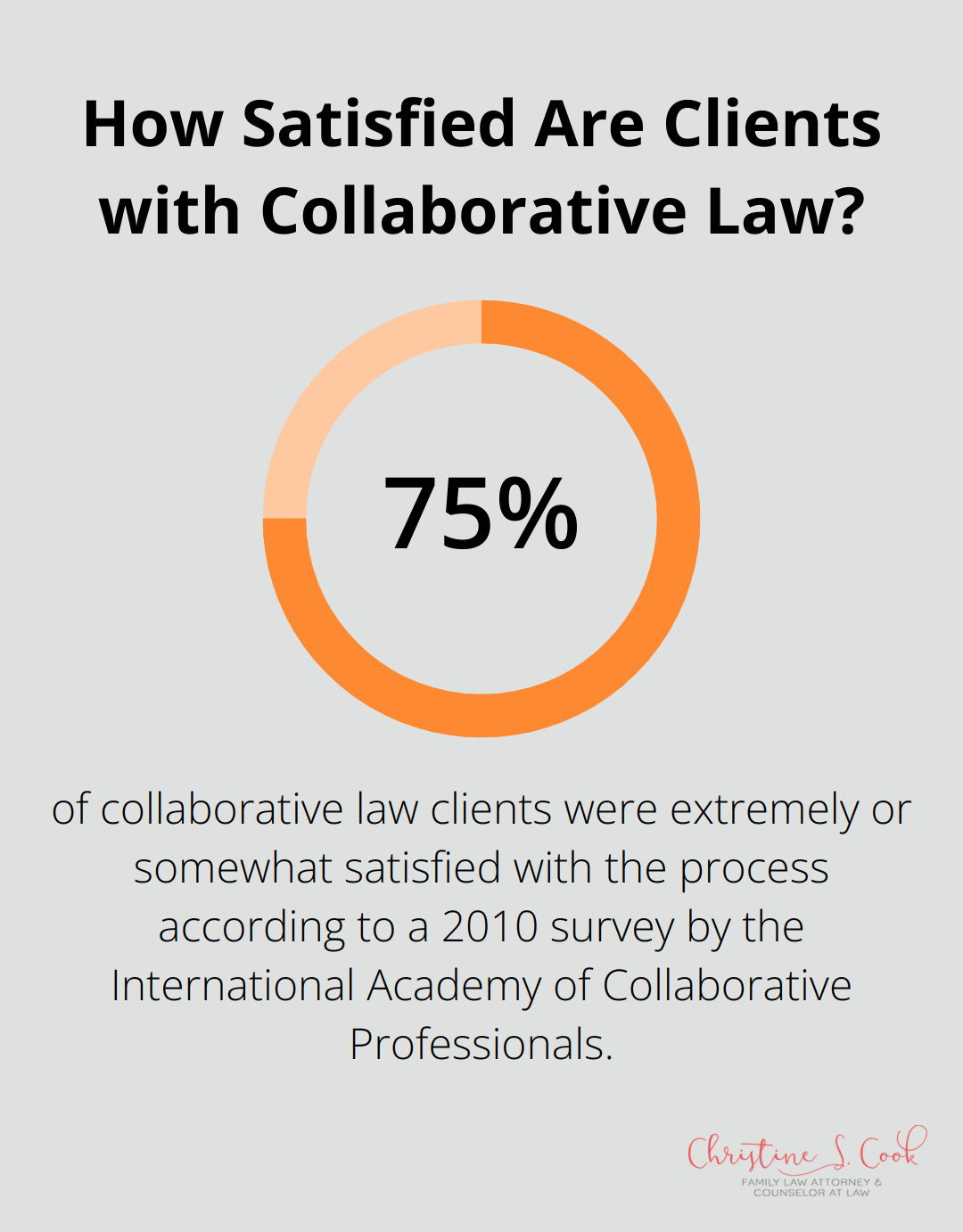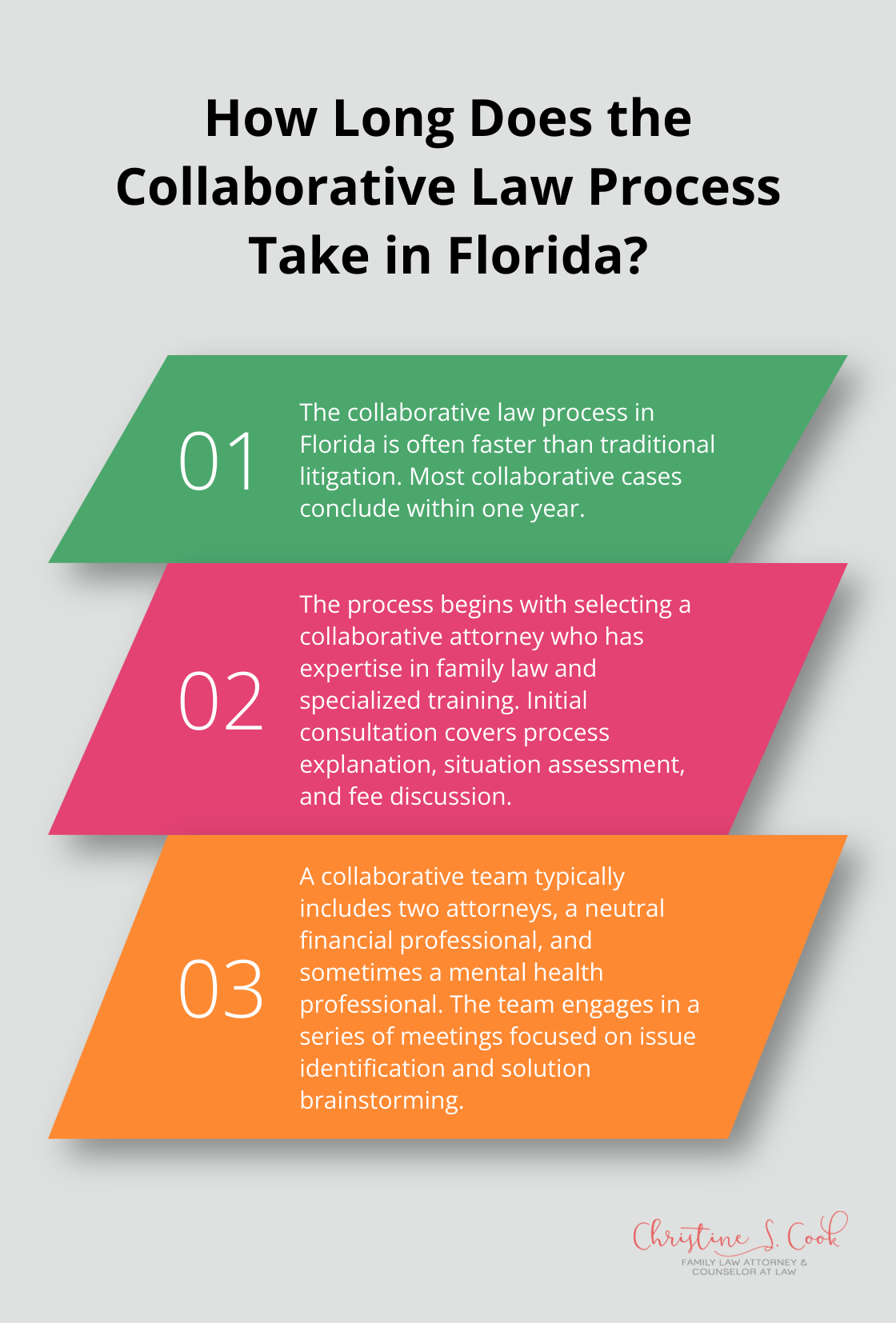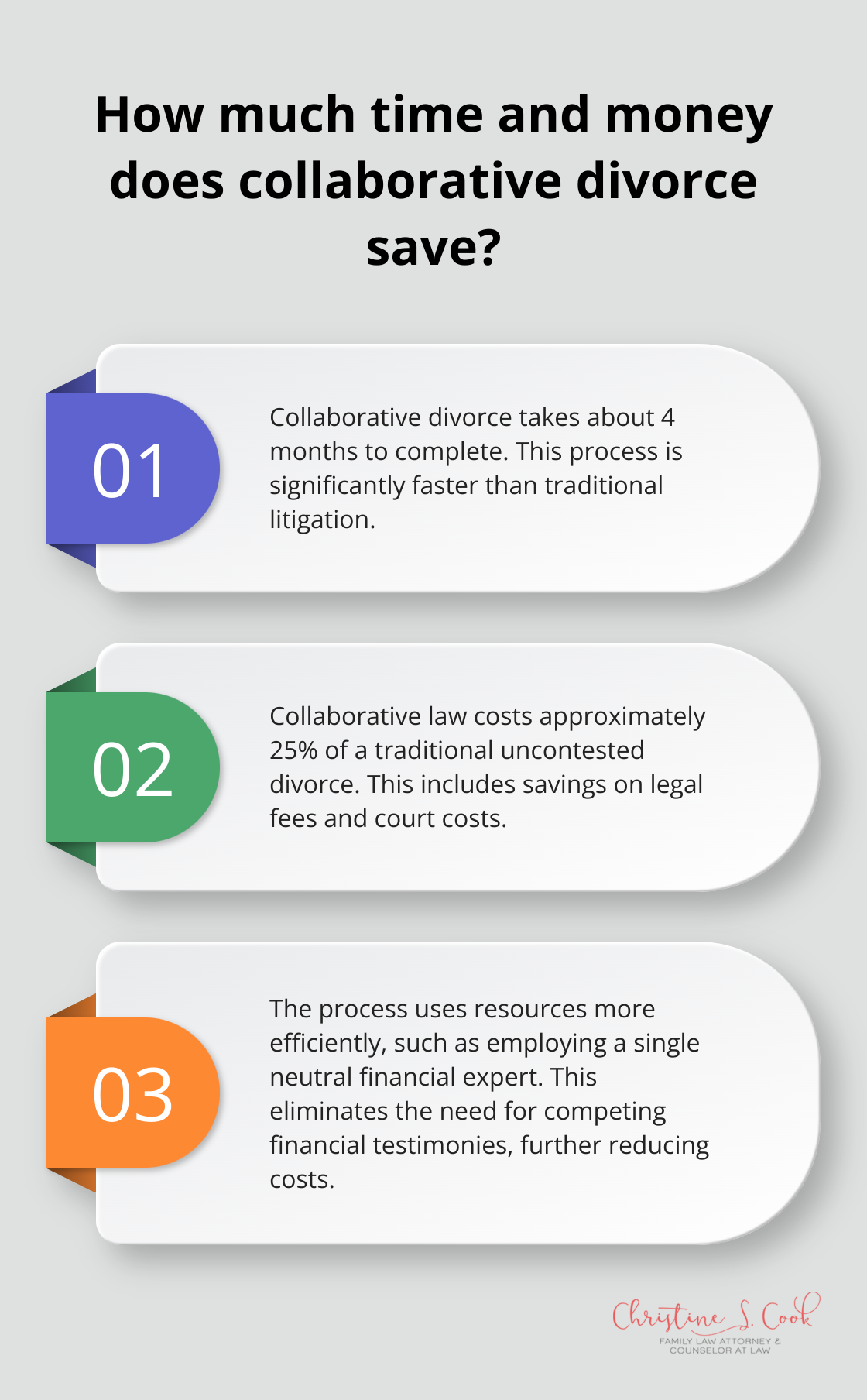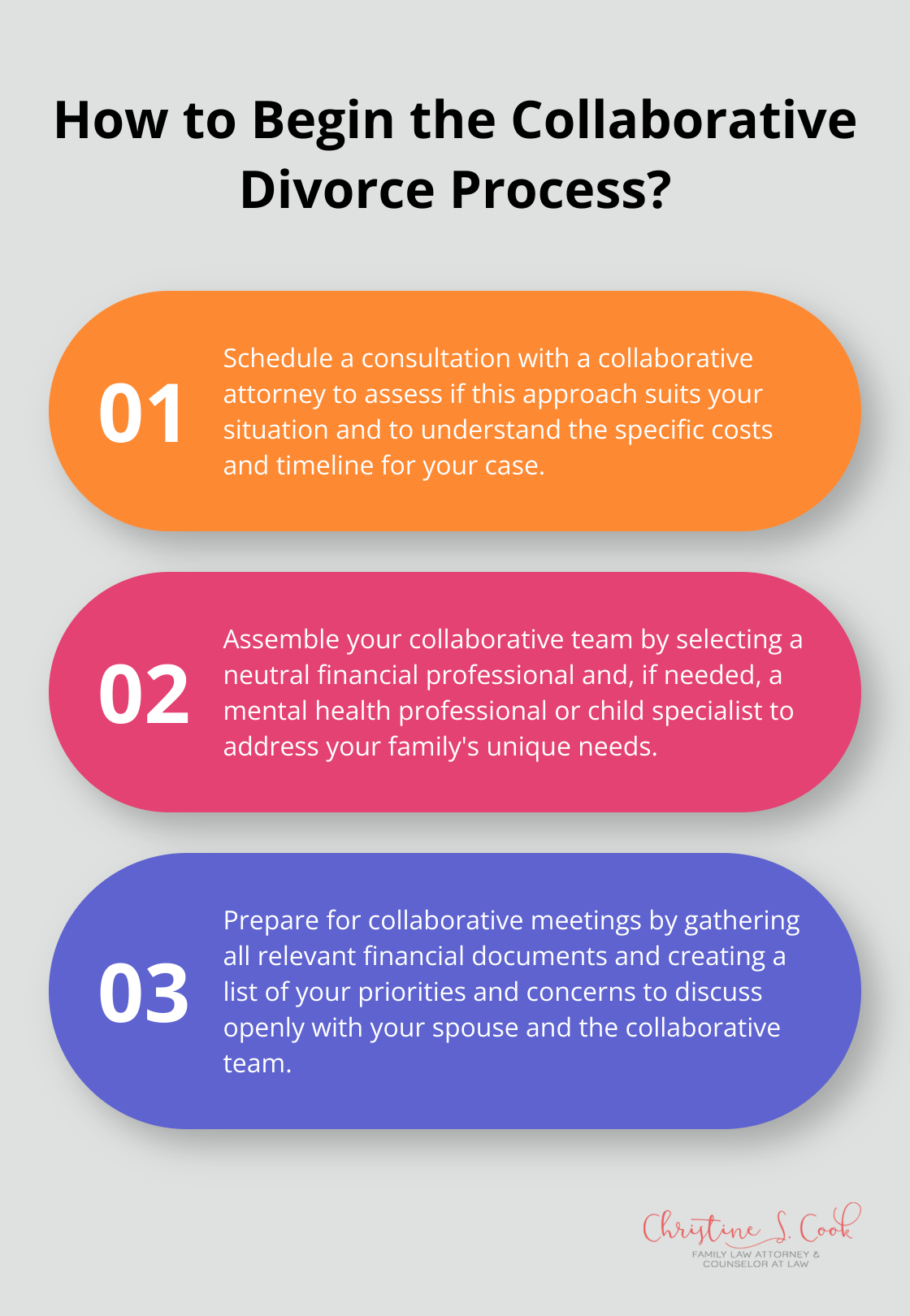At Christine Sue Cook, LLC, we understand that divorce doesn’t have to be a battleground. Collaborative law in Florida offers a peaceful alternative to traditional litigation.
This approach allows couples to work together, with the support of legal professionals, to reach mutually beneficial solutions. In this post, we’ll explore how collaborative law works in Florida and why it might be the right choice for your family.
Collaborative law in Florida represents a groundbreaking method for resolving family conflicts, particularly divorces. This process encourages both parties to collaborate outside the courtroom to achieve mutually beneficial outcomes. The essence of collaborative law lies in cooperation, not confrontation.
In a collaborative divorce, each spouse retains their own collaborative attorney. These legal professionals undergo specialized training in negotiation and conflict resolution. Unlike traditional litigation (where lawyers often adopt adversarial stances), collaborative attorneys function as a team to help their clients find common ground.

The process typically consists of a series of meetings involving the couple, their attorneys, and sometimes other professionals (such as financial advisors or child specialists). This team approach fosters creative problem-solving that addresses the unique needs of each family.
The primary distinction between collaborative law and traditional litigation is the emphasis on cooperation rather than competition. Litigated divorces often result in each side trying to “win” at the other’s expense, which can escalate conflict, increase costs, and prolong proceedings.
Collaborative law, on the other hand, promotes open communication and transparency. All parties sign an agreement at the outset, pledging full disclosure of information and a good-faith effort to reach an agreement. If the process fails and litigation becomes necessary, the collaborative attorneys must withdraw, and new counsel must be hired. This provision creates a powerful incentive for all parties to work towards a resolution.
Collaborative law often leads to quicker resolutions and lower costs compared to traditional litigation. A 2010 survey by the International Academy of Collaborative Professionals indicated that 75% of collaborative law clients were extremely or somewhat satisfied with the process. This high satisfaction rate suggests significant benefits for families choosing this approach.
Furthermore, the collaborative process allows for more creative and tailored solutions. Judges in courtrooms face limitations due to legal guidelines and precedents. In collaborative law, families can craft agreements that truly fit their unique circumstances (whether it’s a complex custody arrangement or an innovative approach to dividing assets).
The collaborative approach transforms the divorce process from a bitter battle into a constructive dialogue. Couples who choose collaboration are more likely to maintain amicable relationships post-divorce, which proves especially critical when children are involved.
As we move forward, let’s explore the specific steps involved in the collaborative law process in Florida, and how it unfolds from start to finish.
The collaborative law journey starts with the selection of a skilled attorney. This choice will shape your entire experience. An ideal collaborative attorney combines family law expertise with specialized training in collaborative techniques. During your initial consultation, the attorney will explain the process, assess your situation, and help determine if this approach suits your needs. They’ll also discuss fees, timelines, and set expectations for the road ahead.
After attorney selection, you’ll assemble your collaborative team. This typically includes:

Each team member contributes unique expertise. The financial professional untangles complex monetary matters, while the mental health professional addresses emotional challenges and co-parenting plans.
The core of the collaborative process involves a series of four-way meetings (you, your spouse, and both attorneys) and sometimes larger team meetings. These sessions focus on issue identification, information gathering, and solution brainstorming.
Unlike adversarial court proceedings, these meetings promote open dialogue and creative problem-solving. Your attorney will help articulate your needs and interests while encouraging compromise where appropriate.
As you progress through collaborative meetings, you’ll work towards agreements on various issues (property division, alimony, child custody, and support). Your team will draft these agreements, ensuring clarity, comprehensiveness, and legal soundness.
Once all issues reach resolution, your attorneys will prepare a final settlement agreement. This document outlines all agreed-upon terms and serves as the basis for your divorce decree.
While the collaborative process occurs outside court, the final step involves submitting your agreement to a judge for approval. In most cases, this step proceeds smoothly, as courts generally respect agreements reached through collaborative law.
Your attorney will handle necessary paperwork and court filings, streamlining this step. Once approved by the judge, your agreement becomes a binding court order, finalizing your divorce.
The collaborative process often moves faster than traditional litigation. Many collaborative cases in Florida conclude within a year. This efficiency often translates to cost savings as well.
As we transition to the next section, let’s explore the numerous benefits that choosing collaborative law in Florida can offer to families seeking a more amicable and constructive approach to divorce.
Collaborative law in Florida transforms the divorce process from a contentious battle into a cooperative effort. This approach reduces stress and conflict during divorce proceedings. Unlike adversarial litigation, where parties often feel pitted against each other, the collaborative process encourages open communication and mutual problem-solving. This shift in dynamics leads to faster resolutions and less emotional turmoil for all involved (especially children).

A study of Collaborative Practice describes the individuals involved in Collaborative cases, how the process works, and the operation of local practice groups.
Choosing collaborative law often results in substantial cost savings compared to traditional litigation. While exact figures vary, research suggests that the collaborative process takes about four months and costs about a fourth of what a traditional uncontested divorce would cost in legal fees and court costs.
The collaborative process allows for more efficient use of professional resources. For instance, a neutral financial expert can provide unbiased analysis for both parties, eliminating the need for competing financial testimonies that often drive up costs in litigation.
Confidentiality stands as a cornerstone of collaborative law in Florida. Unlike court proceedings, which become part of the public record, collaborative discussions remain private. This privacy protection proves particularly valuable for high-profile individuals or those with sensitive personal or financial information.
The confidentiality agreement signed at the outset of the collaborative process ensures that all discussions and documents remain protected. This allows parties to speak freely and explore creative solutions without fear of public exposure or future legal repercussions.
One of the most significant advantages of collaborative law is the flexibility it offers in crafting tailored solutions. Traditional court proceedings often result in one-size-fits-all judgments that may not adequately address the unique needs of each family.
The collaborative process allows for innovative problem-solving. For example, a couple with a family business might develop a co-ownership agreement that preserves the business while accommodating their divorce. Such creative solutions often fall beyond the scope of what a court could order.
The collaborative law process holds the potential to preserve relationships, particularly when children are involved. By focusing on mutual problem-solving rather than winning and losing, collaborative divorce can lay the groundwork for positive co-parenting relationships post-divorce.
This preservation of relationships extends beyond just parents and children. It can help maintain connections with extended family members and mutual friends, reducing the social isolation that often accompanies highly contentious divorces.
Collaborative law in Florida transforms divorce and family disputes. This approach fosters cooperation, reduces conflict, and prioritizes open communication. It leads to more satisfactory outcomes for all parties involved, with lower costs, faster resolutions, and tailored solutions that address each family’s unique needs.

The right collaborative attorney proves essential to the success of this process. An experienced professional guides negotiations, protects interests, and crafts creative solutions. They also manage complex emotions and facilitate productive discussions, even in challenging circumstances.
At Christine S. Cook, LLC, we specialize in collaborative law Florida cases. We offer expert guidance through this innovative process, combining legal expertise with a deep understanding of family dynamics. Contact us for a free consultation to discuss your unique situation and determine if collaborative law aligns with your goals.
